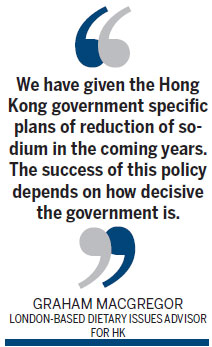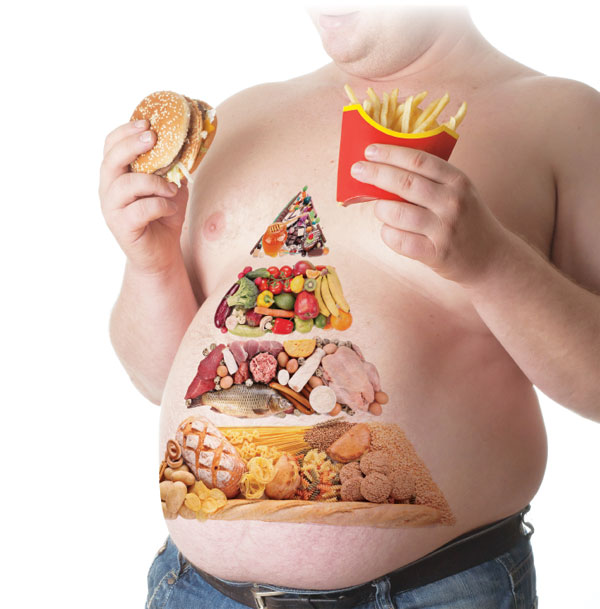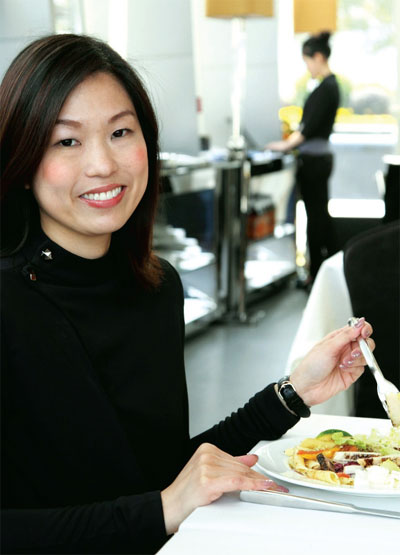Good taste can be bad for your health
Updated: 2014-12-17 07:47
By Frannie Guan(HK Edition)
|
|||||||||
The alarming rise of obesity and diabetes among HK youth could be traced to an excessive intake of sugar and salt, reports Frannie Guan.
There's an epidemic sweeping the globe, setting off a public health crisis right here in Hong Kong. A third of the city's population is overweight or obese - so classified by the Department of Health's 2012 Behavioral Risk Factor Survey. It's an epidemic fed by addiction to manufactured stuff laced with sugar, salt and trans-fats. Some food and nutrition experts call it the deadliest addiction of all. Victims become vulnerable to diabetes, cardiovascular diseases, cancers and a plethora of other maladies.
"The obesity rate here is still quite high," said Dr Lee Ka-fai, president of Diabetes Hong Kong. Obese people, said Lee, are at high risk for diabetes, especially of the Type 2 variety. It's a chronic, incurable illness that may progress to blindness and kidney failure. It can lead to injuries that won't heal but turn gangrenous. And most alarmingly, the city's young people are getting afflicted.
Research reported by the Hong Kong Institute of Diabetes and Obesity at The Chinese University of Hong Kong in July show patients under 40 now comprise 20 percent of the city's diabetic population. The number of early-onset patients (diagnosed before 40) is expected to double by 2030.
"Most Hong Kong people do not pay enough attention to their health and nutrition until their doctor tells them they have high blood pressure or something," said Sylvia Lam, chairperson of the Hong Kong Dietitians' Association. She noted that the local culture has been swept up in "fast foods", from widely distributed Cha Chaan Teng to kiosks selling Thai, Japanese and Western convenience food.
Sasa Chan, 23, a local university student, takes pride in Hong Kong's reputation as a sort of gastronomical Garden of Eden, where people may dine in any one of the thousands of tea houses disbursed all across the landscape. Chan's also proud that Hong Kong, one of the world's most cosmopolitan cities, boasts a veritable cornucopia of international cuisines.
Too sweet for comfort
According to figures published by The Centre for Food Safety under the Food and Environmental Hygiene Department in November, daily consumption of salt and sugar in Hong Kong is way above World Health Organization (WHO) recommendations.
Ho Yuk-yin, consultant at the Centre for Food Safety, said at a press conference that the estimated daily salt intake in Hong Kong was 10 grams, double the WHO's recommended maximum amount. Moreover, 30 percent of the population consumed more than 50 grams of sugar per day. In early 2014, WHO proposed its recommended daily level of sugar intake at 25 grams (around 6 cubes of sugar), underscoring its concern over the consumption of sweetened beverages.
Critics charge that most food addictions are by-products of carefully contrived efforts by processed food manufacturers to get consumers hooked on the sugar, salt and unhealthy fats, so that they keep coming back for more.
Vivien Tsang is only 18, but she's been in a battle with Type 2 diabetes for four years. By the time she was diagnosed at the age of 14, the 1.6-meter-tall girl weighed 70 kilograms, with a Body Mass Index (BMI) of 27. BMI is calculated by dividing the body weight (in kg) by the square of the height (in meter). According to standards established by the WHO, Asians (men and women) whose BMI is between 23.0 and 24.9 are classified as overweight. People whose BMI is over 25.0 are considered obese.
Tsang's parents had taken the girl's hefty helpings of food in stride. They thought she had a "healthy appetite". It didn't bother them when she wolfed down a couple of large bowls of rice, with the salty, fatty foods her grandmother made. She'd finish up with a bottle of sugary orange juice. If she got hungry between meals, she filled up on bread.
A bottle of fruit juice may contain more than 20 grams of sugar. Rice and bread have high sugar content that can cause blood sugar to spike on the downhill road to obesity.
"People just don't feel the need to change their dining habits, because they do not feel sick. They have gotten used to the taste," said Lam. Salt is just one part of a much wider addiction. It's the excess of sodium chloride that arouses health concerns. And sodium chloride is found in excessive amounts in instant noodles, canned foods, soy sauce, chili sauce, marinades, condiments, on top of all the salty junk foods that people have been conditioned to crave.
Lee also pointed out that people who skip breakfast are more likely to eat greasy, high-fat foods at lunch. A survey by the Food and Environmental Hygiene Department revealed in 2010 that around a third of people (32 percent) did not have breakfast every day.
Vivien Tsang always skipped breakfast before she was diagnosed with diabetes. Since her condition was discovered, her mother has been regulating Tsang's daily food intake. Breakfast is now an integral part of her dietary regime. Greasy dishes have been replaced with food cooked in light oil. She's nearly eliminated soy sauce and drinks only unsweetened tea. Her BMI has gone down to around 25.
Know your food
Some people know excessive salt and sugar are toxic but they just don't have the guidelines to show them how they are doing. If the guidelines were put in place, the government would be in a position to regulate the food industry, requiring it to contribute to healthier meals, said Lam.
She contends that the very first step for Hong Kong to address weaknesses in local nutrition would be to carry out regular nutrition surveys, as other places have done for years. In Lam's view, the government could set a timeline and targets for reduction in unhealthy consumption under a long-term plan.
Graham MacGregor, the professor of cardiovascular medicine from London and member of the International Advisory Panel on Reduction of Dietary Sodium and Sugars in Hong Kong, advised that it is high time for the Hong Kong government to identify and probe the sources and set specific regulatory targets for the food industry to reduce the amount of salt and sugar in their products.
"They need to know which are the major contributors, soy sauce for instance. We have given the Hong Kong government specific plans of reduction of sodium in the coming years, and the reduction has to be done gradually," said MacGregor.
In the UK, reducing the salt content in bread is the primary target of dietary sodium reduction. Assessment of dietary sodium levels among adults (aged 19-64) in England done by Department of Health of UK showed that from 2001 to 2011 the salt intake has been reduced from 9.5 to 8.1 gram per day, though the target of 6 gram per day is yet to be achieved.
MacGregor said that the reduction of salt intake prevented around 18,000 strokes and heart attacks a year in UK. "The success of this policy very much depends on how decisive the government is," MacGregor said.
Old habits die hard. Hong Kong people usually wouldn't want to spoil the pleasure of dining by giving up on the familiar flavors. However, cutting back on the salt and sugar they pour into their foods could help insulate them against serious illnesses in the future.
Contact the writer at frannie@chinadailyhk.com

|
Sylvia Lam, chair of Hong Kong Dietitians Association, says people in Hong Kong like to pour a heavy sauce on their lunch to finish it quick and get back to work. Provided to China Daily |

(HK Edition 12/17/2014 page7)
